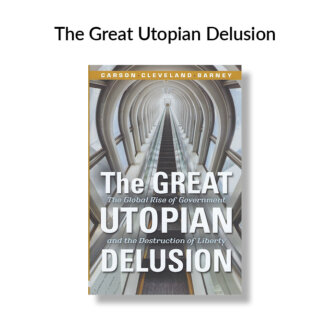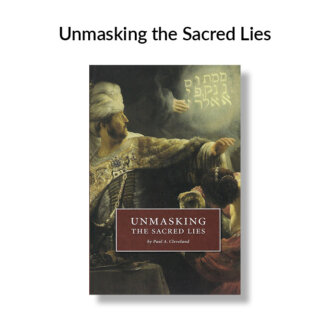A version of this article was first published in the Summer 2024 Worldviews Newsletter of the Apologetics Resource Center.
One of the great ironies of modern America is that the vast expansion of laws and regulations has led to the spread of lawlessness. To put the matter more bluntly, it is my opinion that the number of legal restrictions enacted by our Congress and legal regulations imposed by an assortment of federal agencies has resulted in a general disregard of those rules. To understand why this is true, it is necessary to first understand the nature and purpose of the law itself. When this is done, it will be immediately obvious that much of the modern legal code promotes a false impression about what it means to behave in a civil and lawful fashion. Not only this, but it will also be clear that some of the modern code is at odds with the established order of nature. In this latter instance it is especially important to point out that government mandates, which subvert the natural order of things, are in the final analysis lawless acts regardless of the issue of legality.
Natural Law
Our nation was founded upon the belief in natural law. This belief provided a broad consensus among the various groups of people who made up the nation. At the time, regardless of one’s religious convictions, there was a general agreement that a natural order existed that everyone ought to respect. Then as now, there were religious disagreements. Nonetheless, the people making up the nation understood that there is a natural order of things that establishes a standard of behavior. This shared understanding of the natural law centered upon certain fundamental rights.
Unlike today, the country’s founders shared a very specific view of individual rights. It was understood that everyone had the right to his life, the right to choose his own path in this world, and the right to use his property to pursue his own ends. In essence, by reflecting upon the very make-up of human beings, the founders, regardless of their religious differences, realized that they shared an agreement amongst themselves over these three individual rights. The agreement among them was so pervasive, that they could not fathom anyone disputing them. They reasoned that human beings must possess the right to life, because life itself is an essential characteristic of being human and it ought not be taken away arbitrarily. They reasoned that human beings must also have the right to act because each person is capable of expressing his own will to act. And, finally, they reasoned that the individual must possess the right to property, because as material creatures who need material possessions to survive, property is an indispensable prerequisite for enabling someone to direct the affairs of his life.
Good Government
These three rights served as the bedrock upon which they conceived of good government. Namely, to preserve the rights of the people. Since they assumed that everyone possesses these rights, it is necessary that each person’s rights be maintained with respect to everyone else. Ideally, they understood that self-government would serve this function better than any other option as long as people made their decisions by respecting the rights of others. In fact, they believed that the health of any civilization was determined by the degree to which self-government succeeded. Thus, as long as everyone has a proper regard for others, no outside interference is necessary to secure the peace. If people respect and promote the well-being of others, then they can live and cooperate on mutually agreeable terms.
Nevertheless, the founders did recognize a role for state government and civil law. If history teaches us anything, it demonstrates that there has never been a situation where people perfectly respected the rights of others. In fact, the violation of rights is so pervasive, that anyone willing to make an honest assessment of his own performance will have to confess a failure to uphold the rights of someone else at some point or another. For this reason, some official governmental authority is needed to help secure the rights of the individual. But, how much institutional government is needed?
Institutions That Restrain
To answer the question, we should first note that there are numerous human institutions that serve the governmental function. Primary among these is the family. The family is a natural human institution that children are born into. It is here where they are raised to adulthood. Being responsible for a child’s very existence, parents are responsible for teaching the child how to behave rightly relative to other people. Chief among the many tasks that fall to parents is the task of teaching children to respect the individual rights of others. In pursuing this goal, parents have greater or lesser degrees of success depending on a number of factors. Fortunately, parents are not alone in this endeavor. In addition to families, there are other institutions that also serve to shape human behavior in positive directions. These include churches, schools, and many other voluntary associations.
The relationships among people through the many associations of life tend to restrain selfish displays of gross self-interest that do violence to the rights of others. The more effective these associations are, the more civil society will be. Yet, as effective as social interaction is, there are always some people who disregard others to promote themselves. It is at this point that there is some need for state government. It should be realized though that the need for state action is not of primary importance. In fact, its role is secondary to the functioning of civil society and is only needed when all other remedies have failed. As a result, its role is limited and mainly negative. In particular, the main role of the government is to punish those people who would disregard the rights of others so severely that their unrestrained action threatens civil society. In its proper role, government is an institution of last resort.
Distorted Governmental Role
The problem today is that people have come to accept a new conception of the role of state government. Instead of seeing it as an institution whose primary purpose is to punish wrongdoers within society, and to protect the citizenry from threats made by others outside the civilization, the popular notion today is that it is government’s function to secure the blessings of life by solving the problems common to mankind. To adopt this view, one must believe that the establishment of rules and regulations are all that is needed to secure prudent human action and social cooperation.
Examples of this kind of thinking abound. For instance, if some individuals prove to be prodigals by failing to save for their financial futures, then people who see the world this way call for government action to establish and operate a state-run retirement plan. Or, if some people lack the prudential wisdom of using car seats in transporting their children in their automobiles, then what is needed is a law requiring the use of government approved child restraints. Following this kind of reasoning, the legal code in America has exploded. As a result of this rapid expansion, the nation’s legal code has become incomprehensible. The legal code is so extensive that many parts are contradictory to other parts. The size and complexity of the law baffles not only the simple-minded, but also the highly educated. It has become common to find very learned people who are dumbfounded by the legal restrictions the nation has imposed.
This situation is not desirable for a number of reasons. First, when the vast majority of people do not know what is legal and what is not, the likelihood that they may violate the law is greatly enhanced even if they desire to behave as law abiding citizens. Yet because of the sheer size and scope of the law, people will remain more or less ignorant of it because the cost of obtaining the necessary information about all that is required is too high. As this kind of ignorance of the legal code spreads, people will tend to ascribe less and less significance to it. Increasingly, the law will matter less to people as they go about their lives. In effect, this is tantamount to a declining respect for law. As the respect for the law wanes, there will also be a corollary decline in the respect for authority. This disrespect will be enhanced when people observe others being punished for breaking laws that they themselves find petty or insignificant. The result is a breakdown of the authority structures of society. This will tend to occur even when those structures are the fundamental pillars upon which civilization is built.
Not only will there be a growing disrespect for authority, but there will also be a decline in morality and virtue among the citizens where the legal code proliferates beyond the bounds of reason. As the code expands, the state is actually usurping the authority of the citizenry and of the other institutions in the community that formerly served to promote morally responsible human action. As was already discussed above, institutions such as the family, the church, the schools and other voluntary groups play a crucial role in promoting a standard of moral behavior. If allowed to operate on their own terms, these institutions work fairly well in developing community. However, as the legislature begins to impose more and more restrictions, people tend to become more and more isolated from each other and from these institutions. In this case, the natural social institutions that help the members of society to coalesce together are hamstrung. As this happens, immoral behavior escalates because the relationships that might have served to restrain people beforehand are broken.
Special Interest Groups
Instead, people will tend to gravitate into special interest groups whose aim is to change the law in a particular direction to promote their own interests. Since these groups necessarily compete against each other in the political arena, a growing hostility among them arises. This is especially troublesome when some political interest groups begin to shape the law in ways that undercut the individual rights of people in competing groups. In this case, the legal code itself becomes an instrument of immorality. That is, there is nothing that prevents the legal code from being used to violate the rights of others instead of being the tool that thwarts the evil ends of some. When this happens, the code itself is lawless. The result of all of this activity is less civility among people and greater lawlessness.
As we have already seen, as the legal code expands the level of ignorance over its content grows. And, as people become more ignorant of the law, the likelihood that they will violate it increases. The more numerous the violations, the more costly it is to try to enforce the code. Eventually, the number of violations becomes so numerous that it is impossible to adequately administer the law. At this point, the application of the law will become political. When a vast number of people are guilty of violating some portion of the legal code, it is obvious that the state cannot apprehend, prosecute, and punish everyone. Therefore, to execute the laws at all, officials must do so in some discriminatory fashion. Since governmental power is a handy weapon, those who possess it will inevitably use it to punish their political enemies.
The evidence of this is on full display in the nation today. The significant point to be made is that a legal code that is only enforced for politically expedient ends is an example of lawlessness that also leads to the decline of civilization. For all these reasons, it is wise not only to limit government, but also the number of laws that government enacts so that the resulting legal code is readily known and generally enforced.









0 Comments